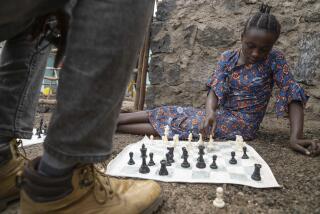Making a Move : Chinese Chess Champ Seeks Protege for $500,000 Challenge
LOS ANGELES â Hereâs the tempting offer from Hong Kong millionaire Henry Fok: He will pay half a million dollars to the first non-Chinese player to win a major tournament of Chinese chess.
Fok, a successful businessman and avid player of Chinese chess who wants to promote the game, made the offer early last year, but no one has been able to claim the prize.
Scott Yen of Alhambra hopes to change that.
Yen, 38, an expert at Chinese chess, wants to discover and train the challenger. He hopes an introductory tournament next month in Los Angeles will attract some budding talents. He has also made plans to hold Chinese chess workshops at the Chinese Cultural Center in Alhambra. Chinese chess is similar to Western chess, but some of the pieces move differently, making them weaker or more powerful. There are only a handful of non-Chinese players worldwide who compete in Chinese chess, and none has won a tournament.
âI havenât met any (non-Chinese) who is near my own standard, and Iâm only an amateur player,â said L. S. Leung, president of the Hong Kong Chinese Chess Assn.
Some players of Western chess, such as Duarte resident Timothy Thompson, have tried Chinese chess but say it is not easy finding playing partners and information about the game.
âIâm looking for a book on this game, but Iâve never seen one,â said Thompson, 39, who is on the board of the Southern California Chess Federation. Thompson, a top player in Western chess clubs in Arcadia and Pasadena, was introduced to Chinese chess in 1971 but has played the game only half a dozen times.
While Chinese chess is still a novelty in Western chess circles, the game is played by more than 520 million people worldwide, Yen said.
Chinese and Western chess are both played with 16 pieces per side, but in Chinese chess there is no queen. The rook, knight, king and pawns move in much the same way as their counterparts in Western chess, but pieces such as the cannon, guard and adviser have no equivalents in Western chess.
To be eligible for the $500,000 prize, the challenger must not be an ethnic Chinese, Yen said. Americans of Chinese ancestry would not qualify. The tournament the challenger must win also has to be of a certain caliber, and Hu Ronghua, the Bobby Fischer of Chinese chess, must be a competitor.
Hu first captured the world championship in 1960 at the age of 15 and held the title for an unprecedented 13 years. Only three or four players have ever been able to win the title twice, Leung said.
Yen has developed a version of the game that features pictures of tanks, helicopters and other military figures instead of Chinese characters on the chess pieces. He believes his version, which sells for $23, makes it easier for non-Chinese players to learn the game.
Sets with standard Chinese characters on the pieces are available, usually for under $5, at Chinese bookstores.
While he is attempting to market his game, Yen is scouring Southern California for the chess prodigy he hopes to coach. He said he does not want any of the winnings offered by Fok, explaining that all of the money would go to the winner.
Yen is not among the worldâs top Chinese chess players, but he is confident he has the skills to train a challenger. âThe coach doesnât have to be stronger than the player,â he said, adding that he will invite experienced players from Hong Kong and Taiwan to help teach his protege.
âIâve got to train some young player,â Yen said. Children have freer imaginations and are not afraid to experiment with new moves, said Yen, who has been fascinated by the board game since childhood.
For Yen and other aficionados of Chinese chess, the game is so exciting that playing it is almost an addiction. âSometimes I play 16 hours a day,â he said. âItâs a realistic game. Itâs not like Western chess, which is so abstract.â
One recent Sunday, Yen met Thompson at Alhambraâs Almansor Park for a game of Chinese chess.
Sitting next to Thompson and kibitzing now and then was Alhambra resident Ed Sanjenis, who sees Chinese chess as a new challenge. âI think European chess has lost its spark,â Sanjenis said. But he said he is not playing Chinese chess in order to go after the $500,000 prize.
âNah, the money doesnât interest me,â Sanjenis said. âItâs the game.â
More to Read
Sign up for Essential California
The most important California stories and recommendations in your inbox every morning.
You may occasionally receive promotional content from the Los Angeles Times.










